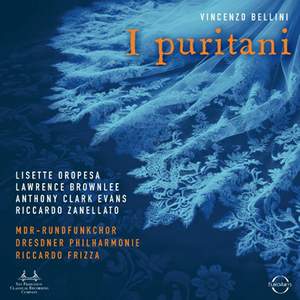I Puritani is the last great masterpiece of the exceptional Italian composer Vincenzo Bellini. The intelligently conceived and thoroughly thrilling historical drama, written by the Italian librettist Conte Carlo Pepoli (1796-1881), concerning the fiery romantic intrigue between Elvira, the daughter of a Puritan and the royalist Arturo - Bellini's rapturous music, full of melancholic intensity, is a delight to listen to, as performed by Lisette Oropesa and Lawrence Brownlee.
The opera is considered a showcase piece for soprano and tenor and holds its own in the rich operatic landscape of the 19th century, especially with its high-pitched passages and bel canto pleasure at its finest, to this day.
Experience Lisette Oropesa in one of her signature roles as Elvira, suffering from anguish of the soul to the point of madness. Lisette Oropesa can be seen live again at the Opéra national de Paris from February 2025.
With Lisette Oropesa as Elvira, one of the most important sopranos of our time could be won for this recording, who not only knows how to convince technically, but also musically masterfully. Thanks to a brilliantly warm soprano voice and a crystal-clear timbre, which is impressively demonstrated not least in perhaps the most demanding duet in Bellini's opera (Sai come arde in petto mio), even the most difficult passages of this complex score are mastered with seemingly effortless ease.
In recent years, Lawrence Brownlee (Arturo) has sung his way into the front row of international bel canto stars with several highly acclaimed performances, and he impressively demonstrates his skills as Arturo on this recording. His agile tenor voice effortlessly reaches dizzying heights while retaining much of its intense power.
For the not particularly extensive discography of I puritani, this recording is certainly a landmark – not only because the vocal colours of the soloists harmonise with impressive precision down to the last detail, but also because the MDR Radio Choir and the Dresden Philharmonic, under the direction of Riccardo Frizza, bring the necessary musical sensitivity to shed a very special light on Bellini's last great masterpiece.



